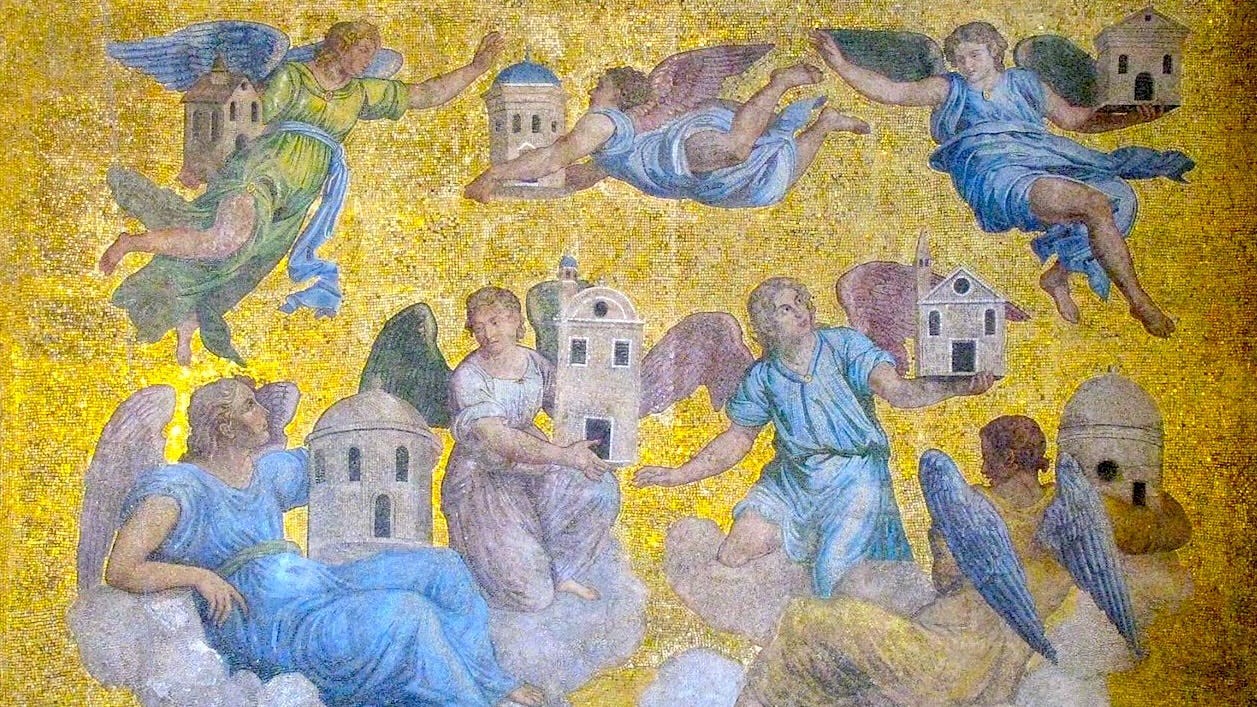Seven Ages of the Church—'Strengthen what remains'
Cardinal Billot's interpretation of the seven churches of the Apocalypse is an encouragement in this crisis facing the Church—as it offers an explanation of our time, and what lies ahead.

Cardinal Billot's interpretation of the seven churches of the Apocalypse is an encouragement in this crisis facing the Church—as it offers an explanation of our time, and what lies ahead.
Editor’s Notes
In the epilogue to his classic work of ecclesiology, Louis Cardinal Billot provides his interpretation of the seven churches and seven angels at the start of the Apocalypse. This sort of schema is popular today, but it is often attributed to private revelations instead of serious theologians.
In Billot’s interpretation, the seven churches represent seven ages for the Church herself.
Billot wrote that the current age, in which we are living, is the fifth age, represented by the Church of Sardis.
Here is the full section:
And to the angel of the church of Sardis write:
These things saith he that hath the seven spirits of God and the seven stars: I know thy works, and that thou hast the name of being alive. And thou art dead.
Be watchful and strengthen the things that remain, which are ready to die. For I find not thy works full before my God.
Have in mind therefore in what manner thou hast received and heard: and observe and do penance: If then thou shalt not watch, I will come to thee as a thief: and thou shalt not know at what hour I will come to thee.
But thou hast a few names in Sardis which have not defiled their garments: and they shall walk with me in white, because they are worthy.
He that shall overcome shall thus be clothed in white garments: and I will not blot out his name out of the book of life. And I will confess his name before my Father and before his angels.
He that hath an ear, let him hear what the Spirit saith to the churches.
(Apoc. 3.-6)
This address does seem very appropriate for our time. For example:
“I know thy works, and that thou hast the name of being alive. And thou art dead.”
The many men who say that they are Catholics, but have in fact left the Church
The many who claim to be good people, but who are pursuing grievous sin on a societal level.
“I find not thy works full before my God.”
The paucity of virtue in the world, including amongst Catholics.
“Have in mind therefore in what manner thou hast received and heard.”
The necessity to hold fast to tradition and what we have received (recalling St Paul’s injunction to the Galatians).
“Observe and do penance: If then thou shalt not watch, I will come to thee as a thief: and thou shalt not know at what hour I will come to thee.”
The necessity of penance and sacrifice, as requested again at Fatima.
“Thou hast a few names in Sardis which have not defiled their garments.”
The horrifyingly small number of Catholics left in the world.
Billot believed that his interpretation should encourage Catholics, because it shows that a future restoration lies before us in the sixth and seventh ages – albeit with further trials along the way.
Amidst this desolation, we find the injunction which we adopted as The WM Review's mission and motto:
“Be watchful and strengthen the things that remain, which are ready to die.”
We want to help Catholics to keep the faith in the worst crisis in the history of the Church, by getting the right ideas out to those who are on the brink of losing the faith and disappearing into heresy, schism or apostasy.
We want to strengthen what remains of the Church, for ourselves, our loved ones, and anyone and everyone who comes across The WM Review.
That is the fundamental reason why The WM Review exists.
If you want to be a part of this, it would be most helpful if you hit the buttons below:
The Seven Churches of the Apocalypse
Louis Cardinal Billot
Epilogue from On the Church of Christ
Translated from Archive, pp 156-162
The Apocalypse mentions seven churches of Asia to which John is commanded to write, so that he might convey messages of salvation to them.
Furthermore, those seven churches symbolise seven epochs or ages within the state of the universal Church, from the Lord’s ascension until his second coming. They also bear mystical names, by which the distinguishing features of each epoch are prophetically designated.
The first church: Ephesus
The first is the church of Ephesus (2.1-7). Now, Ephesus in Greek signifies "impetus," or the beginning of going out and striving towards a goal.
This is fitting for the apostolic age, when, after receiving the Holy Ghost in a mighty rush, the apostles went forth preaching everywhere, with the Lord working alongside them and confirming the word by the signs that followed.
The admonitory letter is also fitting for this age, as it alludes to the pseudo-apostles who are frequently mentioned by Paul, and to the sect of the Nicolaitans, which originated from one of the first seven deacons and was the earliest source of impure Gnosis.1
The second church: Smyrna
The second is the church of Smyrna (2.8-11). Now, Σμυρνα
Smnrna is the same as myrrh, and signifies the age in which, because of the harshness of persecutions and the greatest bitterness of tribulations, the prophetic words concerning the Church were fulfilled:
“My hands dropped with myrrh, and my fingers were full of the choicest myrrh.” (Cant. 5.5)
Hence, to the church of Smyrna, the Spirit significantly says:
“Behold, the devil will cast some of you into prison, that you may be tried: and you shall have tribulation ten days,” clearly signifying the ten general persecutions.
The third church: Pergamum
The third is the church of Pergamum (2.12-17). Now, Pergamum was a city famous in secular writings, from which parchment also derives both its origin and its name.
Moreover, when you hear of parchment, your mind immediately turns to the writing of books and the controversies settled by the pen.
Therefore, the church of Pergamum represents the third age, which was that of the Holy Fathers and Doctors. When the bloody persecutions ceased under Constantine, behold, great heresies were unleashed from the seat of Satan: those of the Arians, Manicheans, Pelagians, Nestorians, etc.
In response, God raised up great men worthy of eternal memory to defend the truth: Athanasius, Basil, Gregory of Nazianzus, Ambrose, Jerome, Augustine, the two Cyrils, and many others, who greatly illuminated the Catholic faith by their writings. Thus, the third age is rightly signified by Pergamum.
It is also appropriate that the warning directed to the angel of this church is addressed to one who, although praised for his steadfastness in faith, is still continually exposed to great dangers, as he dwells “where the seat of Satan is,” and is surrounded on all sides by the doctrines of heretics.2
The fourth church: Thyatira
After the church of Pergamum, in the fourth place comes Thyatira (2.18-29).
Now, Θυατιρος or Θυατειροi signifies "the splendour of triumph" and "solemn pomp," derived from Θυας, Θυαδος, a term originally referring to matters pertaining to the festivals celebrated in honour of Bacchus, and later transferred to signify any kind of solemnity or triumphal procession.
Therefore, the church of Thyatira represents the fourth age, which began with Charlemagne and the establishment of the Holy Roman Empire, whose duration was to be measured by a millennium (from the year 800 to 1800).
Indeed, the establishment of the Holy Roman Empire marked the subordination of the temporal city to the spiritual one, and it served as a crown for the social organisation of the kingdom of our Lord Jesus Christ, of which Isaiah prophesied:
“Arise, be enlightened, O Jerusalem: for thy light is come, and the glory of the Lord is risen upon thee. […] And the Gentiles shall walk in thy light, and kings in the brightness of thy rising. […] And thou shalt suck the milk of the Gentiles, and thou shalt be nursed with the breasts of kings: and thou shalt know that I am the Lord thy Saviour, and thy Redeemer, the Mighty One of Jacob.” (Isa. 60.1, 3, 16)
Thus, in this age, there is solemnity and splendour of triumph, to which all other aspects belonging to this epoch also correspond.3
Yet there is also much stored up in evil, for the mystery of iniquity always works, and as long as the present life is lived, triumph is only in a manner fitting to the Church still militant upon earth. Hence, under the figure of Jezebel are foretold the dreadful schisms and heresies that would desolate the city of God even in this age, such as
The schism of the Greeks in the eleventh century
The heresy of the Albigensians in the thirteenth century
And especially the impiety of the Protestants in the sixteenth century, from which time onwards the affairs of the Christian empire began to decline, and little by little, unnoticed, the era of Revolution was prepared.
The fifth church: Sardis
Now, therefore, Thyatira has ended, and the fifth church, which is in Sardis (3.1-6), has succeeded.
Sardis, indeed, is that famous city of Lydia in which Croesus ruled. It brings to mind the thought of an abundance of gold and silver, of hearts immersed in the riches of this world, of luxury and a certain material prosperity.
Wherefore, the matters concerning the time of this church appear to be in a declining state. Everywhere there is apostasy, everywhere defection, and while many fall away from religion, there are few who remain faithful to Christ:
“But thou hast a few names in Sardis which have not defiled their garments.”
And again:
“Thou hast the name of being alive. And thou art dead.”
A name that you are alive, a name of knowledge, a name of freedom, a name of civilisation, a name of progress; and you are dead, sitting in darkness and the shadow of death, because of the rejected light of life, which is Christ the Lord. Wherefore, it is said to the angel of this church:
“Be watchful and strengthen the things that remain, which are ready to die.”
And he is especially exhorted to remain steadfast in the teachings handed down by the holy apostles, without departing, under the guise and name of higher understanding, from the sense held by the Fathers:
“Have in mind therefore in what manner thou hast received and heard: and observe and do penance.”
These things indeed pertain to the fifth age. But brighter things are to follow.
The sixth church: Philadelphia
Indeed, after the church of Sardis, the sixth will come, which is that of Philadelphia (3.7-13).
And whatever is said about it, all is positive, especially on account of an event of utmost importance, indeed remarkable and quite unique among all the fates of history from the beginning to the present day: that is, the conversion of the fullness of the Jews and their entry into the church of the Gentiles, so that from the two peoples, which were once separated by the dividing wall, there will finally be made one people serving Christ.
In this way, Jacob will be reconciled with Esau, and Isaac with Ishmael, as the Apostle foretold would one day happen (Romans 11.25-32). Hence, this church is called "Philadelphia," which is interpreted as "brotherly love" or "the reconciliation of brothers."
“And to the angel of the church in Philadelphia write... Behold, I will bring of the synagogue of Satan, who say they are Jews and are not, but do lie. Behold, I will make them to come and adore before thy feet. And they shall know that I have loved thee.”
And then also shall be fulfilled what the Apostle predicted in Romans 11.12:
“Now if the offence of [the Jews] be the riches of the world and the diminution of them the riches of the Gentiles: how much more the fulness of them? […]
“For if the loss of them be the reconciliation of the world, what shall the receiving of them be, but life from the dead?” (Romans 11.12, 15)
Thus, in that time we are to expect a marvellous expansion of Christian life throughout the world and a notable victory of Christ and the Church over a conquered Revolution.
I say “conquered,” rather than “destroyed,” because it will meanwhile restore itself with new strength, and inflamed with greater fury, will gird itself under Satan, its leader, for the final struggle, the ultimate contest against Christ the antagonist.
For this reason, the angel of the church in Philadelphia is finally warned that the hour of temptation is near, “which shall come upon the whole world to try them that dwell upon the earth.”
The seventh church: Laodicea
Thus, the seventh and final church remains, which is that of Laodicea (3.14-22). Laodicea means λαων δiκη, that is, “the judgement of the peoples,” indicating by its name the time of the consummation of the world, when Christ will come in the clouds of heaven to judge the living and the dead.
We are in the fifth age, that of Sardis
These, dear reader, are the things about the seven churches of the Apocalypse, or the seven ages of the Church of Christ, which may perhaps not seem improbable to you.
From these, it would also follow that we are now in the fifth age: an age, I say, of defection, apostasy, and liberalism, lying between Thyatira and Philadelphia, between the end of the Holy Roman Empire and that renewal which the Apostle did not hesitate to compare to “resurrection from the dead” (Romans 11.15).
And may our interpretation not depart from the truth! For it would bring hope, amid the present evils which we suffer — truly so many and so great — of a future restoration, and (if I may be permitted the word) a counter-revolution.
Whatever may be the exegetical value of the proposed exposition and its application to our times, at least this much may confidently be asserted: that already from now there appears a sort of foretelling of a better state of affairs, in that those who today hold leadership in either political or economic sciences recognise more and more each day, and without difficulty admit, how disastrous the work of the Revolution has been, how deadly are the fruits of “liberty” — by which, I mean “liberal” or libertine liberty, the liberty of the social contract, the liberty of the ideologues of the year 1789.
The fruits of revolution and liberalism
Those ideologues, of course, did not hesitate to proclaim that the sole cause of public misfortunes and the corruption of governments was the ignorance or contempt of the rights of man, the first of which, they said, was liberty, necessarily accompanied by equality and fraternity.4
O levity! O fatuity! O foolishness! And surely…
… their liberty has ended in despotism, worse than any barbarism, of the powerful over the weak.
… their equality, in an ever-growing multitude of proletarians on one side, and an ever more prevailing oligarchy of millionaires on the other.
… their fraternity finally, in the fermenting of internal divisions scattered everywhere, and an inexpiable hatred of class against class.5
Nor are these things hidden from the discerning minds of our times. Indeed, many minds still remain on the surface, not yet perceiving the essential character of the Revolution, which is satanic.
But there are others who trace the principle more deeply and clearly understand that “the religious question underlies all the other current agitations;” that the plague of political and economic liberalism arose from the atheistic and antichristian liberalism of which we have spoken above; finally, that the social order cannot be firmly established unless the direction of social matters is resumed by the Church.
Hope for restoration
It is therefore to be hoped that, with the help of divine grace, these seeds may come to maturity, that these principles, recognised in theory, may pass into the foundations of restoration.
This restoration we call upon with all our heart’s desires, knowing that under the pagan legislation under which we now live, there may still be Christian individuals, but there cannot be a truly Christian society.
In this, then, we seek entirely the kingdom of God and his righteousness, although we do not refuse the other things that may be added, nor are we unaware that, from the healthy influence of the Church, we may receive what is written about piety: That it “is profitable to all things, having promise of the life that now is and of that which is to come” (1 Tim 4.8).
HELP KEEP THE WM REVIEW ONLINE!
As we expand The WM Review we would like to keep providing free articles for everyone.
Our work takes a lot of time and effort to produce. If you have benefitted from it please do consider supporting us financially.
A subscription from you helps ensure that we can keep writing and sharing free material for all. Plus, you will get access to our exclusive members-only material.
(We make our members-only material freely available to clergy, priests and seminarians upon request. Please subscribe and reply to the email if this applies to you.)
Subscribe now to make sure you always receive our material. Thank you!
Further Reading:
Follow on Twitter, YouTube and Telegram:
“Unto the angel of the church of Ephesus write: […] I know thy works and thy labour [..] And thou hast tried them who say they are apostles and are not: and hast found them liars […] But this thou hast, that thou hatest the deeds of the Nicolaites, which I also hate.”
"To the angel of the church in Pergamum, write: I know where you live, where the seat of Satan is, yet you hold fast to my name, and you did not deny my faith," etc.
“To the angel of the church of Thyatira write: […] I know thy works and thy faith and thy charity and thy ministry and thy patience and thy last works, which are more than the former,” etc.
"The representatives of the people, constituted in the national assembly, considering that the ignorance, forgetting, or contempt of the rights of man are the sole causes of public misfortunes and the corruption of governments, have resolved to set forth in a solemn declaration the natural, inalienable, and sacred rights of man...
“Article 1: Men are born and remain free and equal in rights, etc., etc."
Declaration of the Rights of Man, 1789.
"What do the liberties of labour, commerce, and property mean in economic life, if not the unleashing of all greed against all weakness, or, in the words of a publicist, the freedom one enjoys in the woods? ...
“And what has been gained by all these fine theories? Minds have never been more restless, peoples more discontented, all conditions more precarious.
“Is it political liberty that has been conquered? One half of the citizens is set against everything claimed as a right by the other half.
“Is it equality? Never have there been so many proletarians, nor so many great millionaires.
“Is it fraternity? Never has there been so much selfishness, so many divisions, so much ferment of social war, etc."
De La Tour-du-Pin, Towards a Christian Social Order, III, § 1.






Ven. Bartholomew Holocaust is also very interesting reading on the seven ages of the Church. Thanks for publishing!
Hopefully we’ll see the restoration in our lifetimes. I was first referenced to this interpretation by Bishop Williamson, he did a presentation. I hope that the orthodox as well as the Jews will reunite, and Rome will stop being so corrupt. I think the new Mayan rite is the start of the end, we’ll see!